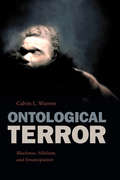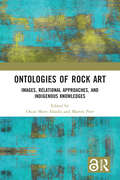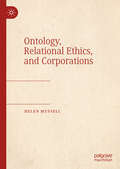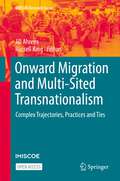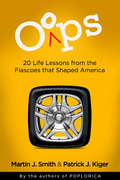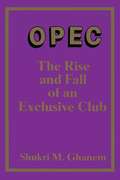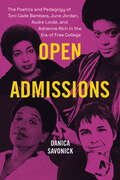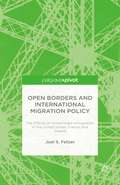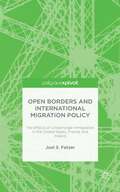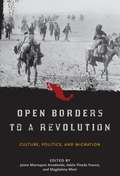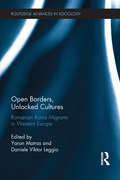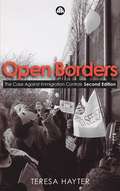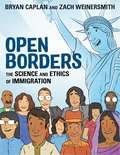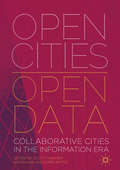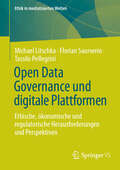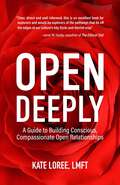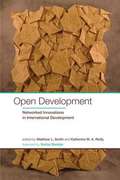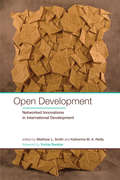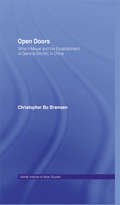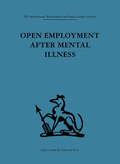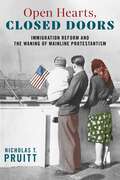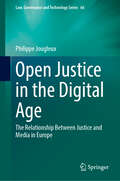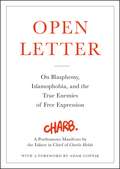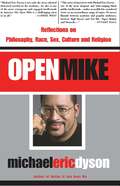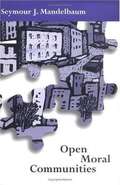- Table View
- List View
Ontological Terror: Blackness, Nihilism, and Emancipation
by Calvin L. WarrenIn Ontological Terror Calvin L. Warren intervenes in Afro-pessimism, Heideggerian metaphysics, and black humanist philosophy by positing that the "Negro question" is intimately imbricated with questions of Being. Warren uses the figure of the antebellum free black as a philosophical paradigm for thinking through the tensions between blackness and Being. He illustrates how blacks embody a metaphysical nothing. This nothingness serves as a destabilizing presence and force as well as that which whiteness defines itself against. Thus, the function of blackness as giving form to nothing presents a terrifying problem for whites: they need blacks to affirm their existence, even as they despise the nothingness they represent. By pointing out how all humanism is based on investing blackness with nonbeing—a logic which reproduces antiblack violence and precludes any realization of equality, justice, and recognition for blacks—Warren urges the removal of the human from its metaphysical pedestal and the exploration of ways of existing that are not predicated on a grounding in being.
Ontologies of Rock Art: Images, Relational Approaches, and Indigenous Knowledges
by Martin Porr Oscar Moro AbadíaOntologies of Rock Art is the first publication to explore a wide range of ontological approaches to rock art interpretation, constituting the basis for groundbreaking studies on Indigenous knowledges, relational metaphysics, and rock imageries. The book contributes to the growing body of research on the ontology of images by focusing on five main topics: ontology as a theoretical framework; the development of new concepts and methods for an ontological approach to rock art; the examination of the relationships between ontology, images, and Indigenous knowledges; the development of relational models for the analysis of rock images; and the impact of ontological approaches on different rock art traditions across the world. Generating new avenues of research in ontological theory, political ontology, and rock art research, this collection will be relevant to archaeologists, anthropologists, and philosophers. In the context of an increasing interest in Indigenous ontologies, the volume will also be of interest to scholars in Indigenous studies. Chapter 14 of this book is freely available as a downloadable Open Access PDF under a Creative Commons Attribution-Non Commercial-No Derivatives 4.0 license available at https://www.taylorfrancis.com/books/edit/10.4324/9780429321863/ontologies-rock-art-oscar-moro-abad%C3%ADa-martin-porr?context=ubx&refId=3766b051-4754-4339-925c-2a262a505074
Ontology, Relational Ethics, and Corporations
by Helen MussellThis book offers a unique exploration and analysis of social responsibility and associated ethical concepts used by business and financial organizations. Mussell lays out the argument that a realist analysis of social responsibility reveals caring relations underpinning this ethical behavior. The combination of a realist social ontology with contemporary relational care ethics provides the theoretical framework needed to successfully explore the ethics of social responsibility. She then applies this realist caring relations argument to three specific contexts in which social responsibility is explicitly evident - including corporate social responsibility, socially responsible investment, and the legal concept of the fiduciary. By tracing the historical development of each concept – including how economic methodology has influenced interpretations and practice – a complex picture emerges, showing how ethics, economic theory, and political theory intersect. This is an insightful work of philosophically informed contemporary political economy, analyzing the evolution and connection of key ethical concepts widely used by organizations.
Onward Migration and Multi-Sited Transnationalism: Complex Trajectories, Practices and Ties (IMISCOE Research Series)
by Russell King Jill AhrensThis open access book brings novel perspectives to the scholarship on transnational migration. The book stresses the complexity of migration trajectories and proposes multi-sited field studies to capture this complexity. Its constituent chapters offer examples of onward migration spanning all major world regions. The contents exemplify a range of interdisciplinary approaches, including both qualitative and quantitative methodologies. The result is an impressive remapping and reconceptualisation of global migration and mobility, of interest to students and policy-makers alike.
Oops
by Martin J. Smith Patrick J. KrigerAmericans' failures are as spectacular as their successes: bridges that collapse; flying cars that crash; sports promotions run amok; deodorant that nearly destroyed the earth; even failures that failed to happen! Veteran journalists Martin J. Smith and Patrick J. Kiger select twenty miscues, goofs, complications, and failures that shaped modern America and reveal the life lessons these gaffes teach, including:-Accentuate the Positive: How Thomas Edison Invented Trash Talk-Understand the Market: The 1967 Monkees-Jimi Hendrix Concert Tour-Desperation Is the Cradle of Bad Ideas: Cleveland Indians' Ten-Cent Beer Night-Sweat the Details: The Sixty-Story John Hancock GuillotineEnriched by handy clip-'n'-save "Recipes for Disaster," Oops proves that when it comes to failure, truth is stranger than fiction.
Opec: The Rise and Fall of an Exclusive Club
by GhanemFirst published in 1986. Routledge is an imprint of Taylor & Francis, an informa company.
Open Admissions: The Poetics and Pedagogy of Toni Cade Bambara, June Jordan, Audre Lorde, and Adrienne Rich in the Era of Free College
by Danica SavonickIn Open Admissions Danica Savonick traces the largely untold story of the teaching experience of Toni Cade Bambara, June Jordan, Audre Lorde, and Adrienne Rich at the City University of New York (cuny) in the late 1960s and early 1970s. This period, during which cuny guaranteed tuition-free admission to every city high school graduate, was one of the most controversial in US educational history. Analyzing their archival teaching materials—syllabi, lesson plans, and assignments—alongside their published work, Savonick reveals how these renowned writers were also transformative educators who developed creative methods of teaching their students to navigate and change the world. In fact, many of their methods—such as student-led courses, collaborative public projects, and the publication of student writing—anticipated the kinds of student-centered and antiracist pedagogies that have become popular in recent years. In addition to recovering the pedagogical legacy of these writers, Savonick shows how teaching in cuny’s free and open classrooms fundamentally altered their writing and, with it, the course of American literature and feminist criticism.
Open Borders and International Migration Policy: The Effects of Unrestricted Immigration in the United States, France, and Ireland
by J. FetzerAlthough philosophers debate the morality of open borders, few social scientists have explored what would happen if immigration were no longer limited. This book looks at three examples of temporarily unrestricted migration in Miami, Marseille, and Dublin and finds that the effects were much less catastrophic than opponents of immigration claim.
Open Borders and International Migration Policy: The Effects of Unrestricted Immigration in the United States, France, and Ireland
by Joel S. FetzerOpen Borders and International Migration Policy.
Open Borders to a Revolution: Culture, Politics, and Migration
by Jaime Marroquin Magdalena Mieri Adela Pineda FrancoOpen Borders to a Revolution is a collective enterprise studying the immediate and long-lasting effects of the Mexican Revolution in the United States in such spheres as diplomacy, politics, and intellectual thought. It marks both the bicentennial of Latin America's independence from Spain and the centennial of the Mexican Revolution, an anniversary with significant relevance for American history. The Smithsonian partnered with several institutions and organized a series of cultural events, among them an academic symposium whose program was envisioned and developed by the editors of this volume: "Creating an Archetype: The Influence of the Mexican Revolution in the United States." The symposium gathered scholars who engaged in conversation and debate on several aspects of U.S.-Mexico relations, including the Mexican-American experience. This volume consolidates the results of those intellectual exchanges, adding new voices, and providing a wide-ranging exploration of the Mexican Revolution.
Open Borders, Unlocked Cultures: Romanian Roma Migrants in Western Europe (Routledge Advances in Sociology)
by Yaron Matras and Daniele Viktor LeggioThe book examines some of the dilemmas surrounding Europe’s open borders, migrations, and identities through the prism of the Roma – Europe’s most dispersed and socially marginalised population. The volume challenges some of the myths surrounding the Roma as a ‘problem population’, and places the focus instead on the context of European policy and identity debates. It comes to the conclusion that the migration of Roma and the constitution of their communities is shaped by European policy as much as, and often more so, than by the cultural traits of the Roma themselves. The chapters compare case studies of Roma migrants in Spain, Italy, France, and Britain and the impact of migration on the origin communities in Romania. The study combines historical and ethnographic methods with insights from migration studies, drawing on a unique multi-site collaborative project that for the first time gave Roma participants a voice in shaping research into their communities. Chapters 1 and 7 of this book are freely available as downloadable Open Access PDFs at http://www.taylorfrancis.com under a Creative Commons Attribution-Non Commercial-No Derivatives (CC-BY-NC-ND) 4.0 license.
Open Borders: The Case Against Immigration Controls
by Teresa HayterVery thorough analysis of immigration from the pro-immigration point of view. Mostly covers Britain.
Open Borders: The Science and Ethics of Immigration
by Bryan CaplanAn Economist “Our Books of the Year” SelectionEconomist Bryan Caplan makes a bold case for unrestricted immigration in this fact-filled graphic nonfiction. American policy-makers have long been locked in a heated battle over whether, how many, and what kind of immigrants to allow to live and work in the country. Those in favor of welcoming more immigrants often cite humanitarian reasons, while those in favor of more restrictive laws argue the need to protect native citizens. But economist Bryan Caplan adds a new, compelling perspective to the immigration debate: He argues that opening all borders could eliminate absolute poverty worldwide and usher in a booming worldwide economy—greatly benefiting humanity. With a clear and conversational tone, exhaustive research, and vibrant illustrations by Zach Weinersmith, Open Borders makes the case for unrestricted immigration easy to follow and hard to deny.
Open Cities | Open Data: Collaborative Cities in the Information Era
by Hoon Han Scott Hawken Christopher PetitToday the world’s largest economies and corporations trade in data and its products to generate value in new disruptive markets. Within these markets vast streams of data are often inaccessible or untapped and controlled by powerful monopolies. Counter to this exclusive use of data is a promising world-wide “open-data” movement, promoting freely accessible information to share, reuse and redistribute. The provision and application of open data has enormous potential to transform exclusive, technocratic “smart cities” into inclusive and responsive “open-cities”.This book argues that those who contribute urban data should benefit from its production. Like the city itself, the information landscape is a public asset produced through collective effort, attention, and resources. People produce data through their engagement with the city, creating digital footprints through social medial, mobility applications, and city sensors. By opening up data there is potential to generate greater value by supporting unforeseen collaborations, spontaneous urban innovations and solutions, and improved decision-making insights. Yet achieving more open cities is made challenging by conflicting desires for urban anonymity, sociability, privacy and transparency. This book engages with these issues through a variety of critical perspectives, and presents strategies, tools and case studies that enable this transformation.
Open Data Governance und digitale Plattformen: Ethische, ökonomische und regulatorische Herausforderungen und Perspektiven (Ethik in mediatisierten Welten)
by Tassilo Pellegrini Michael Litschka Florian SaurweinDieses Buch behandelt ethische, ökonomische und regulatorische Aspekte der Open Data Governance bei digitalen Plattformen. Wie Unternehmen der digitalen Ökonomie mit offenen Daten umgehen, wirft viele gesellschaftlich relevante Fragen auf: Wie können offene Daten und der darauf beruhende Content möglichst weit in der Bevölkerung verbreitet werden? Wie kann Content Moderation transparent organisiert und wie können Dateninfrastrukturen sozial erwünscht gestaltet werden? Das Buch analysiert die Fallstudien offene digitale Public-Value Plattformen, offene digitale Dateninfrastrukturen und Content Moderation und Kuratierung auf digitalen Plattformen und entwickelt Governance-Modelle, die eine Beurteilung verschiedener Regulierungsmöglichkeiten für Unternehmen der digitalen Plattformökonomie ermöglichen.
Open Deeply: A Guide to Building Conscious, Compassionate Open Relationships
by Kate LoreeA full one-fifth of the United States has engaged in consensual non-monogamy (CNM) at some point in their lives, and 29 percent of adults under thirty today consider open relationships to be morally acceptable—yet there are few resources to turn to when it comes to navigating this more non-traditional and explorative territory. Picking up where CNM self-help books like Polysecure, The Ethical Slut, and More Than Two leave off, Open Deeply tackles the most difficult challenges posed by CNM. Therapist Kate Loree—who has practiced non-monogamy since 2003, and who specializes in treating clients who also practice non-monogamy—pulls no punches as she uses vignettes based on her own life, as well as her clients’ experiences, to illustrate the highs, lows, and in-betweens of life as a consensual non-monogamist. Interwoven with these stories are thorough explanations of how attachment theory impacts non-monogamy, how blending cutting-edge, neurobiology-informed grounding skills with effective communication skills will make even the most challenging conversations regarding non-monogamy manageable, and more. The result is a compassionate, attachment-focused template for non-monogamy that will allow readers to avoid pitfalls and find adventure while concurrently building healthy relationships. Non-monogamy is a wild and woolly ride—and Open Deeply is here to help make it a great one.
Open Development
by Yochai Benkler Matthew L. Smith Katherine M. ReillyThe emergence of open networked models made possible by digital technology has the potential to transform international development. Open network structures allow people to come together to share information, organize, and collaborate. Open development harnesses this power, to create new organizational forms and improve people's lives; it is not only an agenda for research and practice but also a statement about how to approach international development. In this volume, experts explore a variety of applications of openness, addressing challenges as well as opportunities.Open development requires new theoretical tools that focus on real world problems, consider a variety of solutions, and recognize the complexity of local contexts. After exploring the new theoretical terrain, the book describes a range of cases in which open models address such specific development issues as biotechnology research, improving education, and access to scholarly publications. Contributors then examine tensions between open models and existing structures, including struggles over privacy, intellectual property, and implementation. Finally, contributors offer broader conceptual perspectives, considering processes of social construction, knowledge management, and the role of individual intent in the development and outcomes of social models. ContributorsCarla Bonina, Ineke Buskens, Leslie Chan, Abdallah Daar, Jeremy de Beer, Mark Graham, Eve Gray, Anita Gurumurthy, Havard Haarstad, Blane Harvey, Myra Khan, Melissa Loudon, Aaron K. Martin, Hassan Masum, Chidi Oguamanam, Katherine M. A. Reilly, Ulrike Rivett, Karl Schroeder, Parminder Jeet Singh, Matthew L. Smith, Marshall S. SmithCopublished with the International Development Research Centre of Canada (IDRC)
Open Development: Networked Innovations in International Development (International Development Research Centre)
by Matthew L. Smith Katherine M. A. ReillyExperts explore current theory and practice in the application of digitally enabled open networked social models to international development. The emergence of open networked models made possible by digital technology has the potential to transform international development. Open network structures allow people to come together to share information, organize, and collaborate. Open development harnesses this power, to create new organizational forms and improve people's lives; it is not only an agenda for research and practice but also a statement about how to approach international development. In this volume, experts explore a variety of applications of openness, addressing challenges as well as opportunities.Open development requires new theoretical tools that focus on real world problems, consider a variety of solutions, and recognize the complexity of local contexts. After exploring the new theoretical terrain, the book describes a range of cases in which open models address such specific development issues as biotechnology research, improving education, and access to scholarly publications. Contributors then examine tensions between open models and existing structures, including struggles over privacy, intellectual property, and implementation. Finally, contributors offer broader conceptual perspectives, considering processes of social construction, knowledge management, and the role of individual intent in the development and outcomes of social models. ContributorsCarla Bonina, Ineke Buskens, Leslie Chan, Abdallah Daar, Jeremy de Beer, Mark Graham, Eve Gray, Anita Gurumurthy, Havard Haarstad, Blane Harvey, Myra Khan, Melissa Loudon, Aaron K. Martin, Hassan Masum, Chidi Oguamanam, Katherine M. A. Reilly, Ulrike Rivett, Karl Schroeder, Parminder Jeet Singh, Matthew L. Smith, Marshall S. SmithCopublished with the International Development Research Centre of Canada (IDRC)
Open Doors: Vilhelm Meyer and the Establishment of General Electric in China
by Christopher Bo BramsenOn one level, this is an intriguing account of expat life in Shanghai's International settlement in the early 20th century. On another level is charted the introduction and growth of new western technologies and companies in China. And the backdrop to these stories is early 20th century China itself: the hopes, fears, turmoil and grandeur of the age.
Open Employment after Mental Illness
by Nancy Wansbrough Philip CooperTavistock Press was established as a co-operative venture between the Tavistock Institute and Routledge & Kegan Paul (RKP) in the 1950s to produce a series of major contributions across the social sciences. This volume is part of a 2001 reissue of a selection of those important works which have since gone out of print, or are difficult to locate. Published by Routledge, 112 volumes in total are being brought together under the name The International Behavioural and Social Sciences Library: Classics from the Tavistock Press. Reproduced here in facsimile, this volume was originally published in 1980 and is available individually. The collection is also available in a number of themed mini-sets of between 5 and 13 volumes, or as a complete collection.
Open Hearts, Closed Doors: Immigration Reform and the Waning of Mainline Protestantism
by Nicholas T. PruittA history of mainline Protestant responses to immigrants and refugees during the twentieth centuryOpen Hearts, Closed Doors uncovers the largely overlooked role that liberal Protestants played in fostering cultural diversity in America and pushing for new immigration laws during the forty years following the passage of the restrictive Immigration Act of 1924. These efforts resulted in the complete reshaping of the US cultural and religious landscape.During this period, mainline Protestants contributed to the national debate over immigration policy and joined the charge for immigration reform, advocating for a more diverse pool of newcomers. They were successful in their efforts, and in 1965 the quota system based on race and national origin was abolished. But their activism had unintended consequences, because the liberal immigration policies they supported helped to end over three centuries of white Protestant dominance in American society.Yet, Pruitt argues, in losing their cultural supremacy, mainline Protestants were able to reassess their mission. They rolled back more strident forms of xenophobia, substantively altering the face of mainline Protestantism and laying foundations for their responses to today’s immigration debates. More than just a historical portrait, this volume is a timely reminder of the power of religious influence in political matters.
Open Justice in the Digital Age: The Relationship Between Justice and Media in Europe (Law, Governance and Technology Series #66)
by Philippe JougleuxThis book discusses the principle of open justice with a focus on the mechanism of video streaming of court proceedings. The principle of open justice is multidimensional and involves both the human right to a fair trial and freedom of expression. The book distinguishes between three components of open justice: public hearings, media coverage of proceedings, and publication of judgments. All three have been and/or could be substantially affected by the digital revolution: public hearings could benefit from video streaming, the media coverage from social media, and the publication of judgments from online databases. The book analyses recent advances and challenges related to the digitalization of open justice. Particular attention is paid to the relevant case law of European courts, to the impact of the GDPR with an emphasis on the sensitive issue of pseudonymizing judgments, and to a comparison of various national practices. Although the book’s primary focus is on European law, it will also be of interest to scholars from other continents, either for purposes of comparative research, or because the topic itself touches on general theory of law issues.
Open Letter: On Blasphemy, Islamophobia, and the True Enemies of Free Expression
by Adam Gopnik CharbAn impassioned defense of the freedom of speech, from Stéphane Charbonnier, a journalist murdered for his convictionsOn January 7, 2015, two gunmen stormed the offices of the French satirical newspaper Charlie Hebdo. They took the lives of twelve men and women, but they called for one man by name: "Charb." Known by his pen name, Stéphane Charbonnier was editor in chief of Charlie Hebdo, an outspoken critic of religious fundamentalism, and a renowned political cartoonist in his own right. In the past, he had received death threats and had even earned a place on Al Qaeda's "Most Wanted List." On January 7 it seemed that Charb's enemies had finally succeeded in silencing him. But in a twist of fate befitting Charb's defiant nature, it was soon revealed that he had finished a book just two days before his murder on the very issues at the heart of the attacks: blasphemy, Islamophobia, and the necessary courage of satirists. Here, published for the first time in English, is Charb's final work. A searing criticism of hypocrisy and racism, and a rousing, eloquent defense of free speech, Open Letter shows Charb's words to be as powerful and provocative as his art. This is an essential book about race, religion, the voice of ethnic minorities and majorities in a pluralistic society, and above all, the right to free expression and the surprising challenges being leveled at it in our fraught and dangerous time.
Open Mike: Reflections on Philosophy, Race, Sex, Culture and Religion
by Michael Eric DysonHere, collected for the first time, are interviews and essays representing Michael Eric Dyson's most important thinking on race and identity. Exploring such topics as "whiteness" as seen through a black man's eye, modernism and postmodernism in black culture, and the emancipating role of black music from the plantation to the ghetto, Open Mike is a perfect introduction to Dyson's work and a must-have for students and scholars in African American Studies and Cultural Studies.
Open Moral Communities
by Seymour J. MandelbaumSeymour Mandelbaum's extended reflection on communities and the myths that sustain them is a plea for a communitarian sensibility. Communities are critically important in maintaining and adapting public moral orders.
